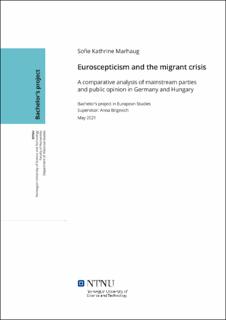| dc.contributor.advisor | Brigevich, Anna | |
| dc.contributor.author | Marhaug, Sofie Kathrine | |
| dc.date.accessioned | 2021-09-13T16:08:11Z | |
| dc.date.available | 2021-09-13T16:08:11Z | |
| dc.date.issued | 2021 | |
| dc.identifier | no.ntnu:inspera:80491188:43285260 | |
| dc.identifier.uri | https://hdl.handle.net/11250/2775726 | |
| dc.description.abstract | I 2015 kom 1,8 millioner flyktninger til Europa som et resultat av flyktningkrisen. Dette innebar en økende fremmedfrykt blant den europeiske befolkningen, samt politiske partier. Et godt eksempel er Ungarn, som satte opp piggtrådgjerder langs grensen for å hindre flykningene. Samtidig viser andre medlemsland en mer positiv respons, slik som Tyskland. Med Merkels ‘Willkommenspolitik’ tok landet imot et stort antall flykninger. Imidlertid var det høye nivået av migranter i begge land nødt til å skape et skifte i samfunnet. Ettersom at dette var en europeisk krise, der mangelen på en felles politikk i EU var tydelig, var det forventet at euroskepsisen skulle øke i. Ved hjelp av data fra Chapel Hill Expert Survey og Eurobarometer, vil jeg utføre en analyse på to nivå, som skal undersøke graden av euroskeptisisme i følgende politiske partier, CDU i Tyskland og Fidesz i Ungarn, samt opinionen i nevnte land. I påvente av et høyere nivå av euroskeptisisme blant befolkningen enn de politiske partiene, kom analysen med en uventet konklusjon. Analysen viser at befolkningen i både Tyskland og Ungarn har en mer positiv holdning til europeisk integrasjon enn partiene som ble analysert. | |
| dc.description.abstract | The migrant crisis of 2015 resulted in not only 1.8 million migrants entering Europe, but also evoked xenophobic tendencies in political parties and public opinion. This is clearly seen in Hungary’s response, when they put up barbwire fences. Germany chose a different strategy with Merkel’s ‘Willkommenspolitik’. However, the high level of migrants in both countries were bound to create a shift in society. As this was a European crisis, and the European Union lacked a common policy in managing a crisis at such scale, a rise in Euroscepticism was expected. By conducting a two-level analysis using Chapel Hill Expert Survey and Eurobarometer data, I examine the level of Euroscepticism in the mainstream parties in Germany and Hungary, the CDU and Fidesz, respectively, as well as in public opinion in said countries. Anticipating a higher level of Euroscepticism in the public than the political parties, the analysis reaches an unexpected conclusion, revealing a more positive attitude towards European integration in the public opinion in Germany and Hungary than the corresponding parties. | |
| dc.language | eng | |
| dc.publisher | NTNU | |
| dc.title | Euroscepticism and the migrant crisis-
A comparative analysis of mainstream parties and
public opinion in Germany and Hungary | |
| dc.type | Bachelor thesis | |
